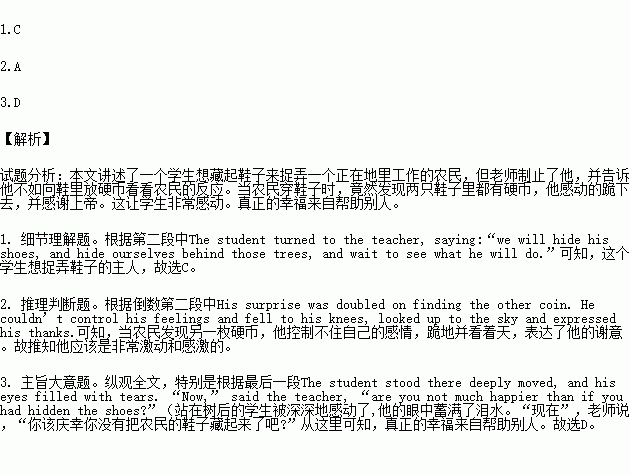题目内容
A student was one day taking a walk with his teacher. As they went along, they saw a pair of old shoes lying in the path. They were a poor farmer’s, who was working in the nearby field.
The student turned to the teacher, saying: “we will hide his shoes, and hide ourselves behind those trees, and wait to see what he will do.”
“My young friend,” answered the teacher, “we should never make fun of the poor. Why not put a coin in each shoe, and then we will hide ourselves and watch?” The student did so and they both hid themselves behind the trees. The poor man soon finished his work, and came across the field to the path where he had left his coat and shoes.
After putting on his coat, he put his foot into one of his shoes, and felt something hard. Then he bent (弯腰) down to feel what it was, and found the coin. Surprised, he looked at the coin, turned it around and looked at it again. He then looked around, but no person was seen. He put the money into his pocket, and continued to put on the other shoe. His surprise was doubled on finding the other coin.
He couldn’t control his feelings and fell to his knees, looked up to the sky and expressed his thanks. Then he spoke of his wife, sick and helpless, and his children without bread. He said the help would save them from dying.
The student stood there deeply moved, and his eyes filled with tears. “Now,” said the teacher, “are you not much happier than if you had hidden the shoes?”
1.When the student saw the shoes, he wanted to ________.
A. steal them
B. find their owner
C. play a joke on the owner
D. give the owner some money
2.When the farmer saw the second coin, he ________.
A. was very excited and grateful
B. was worried and looked up at the sky
C. was surprised and decided to find the owner
D. spoke of his difficulties and asked for more help
3.What can we learn from the passage?
A. It is never too late to learn.
B. All good things come to an end.
C. Where there is a will, there is a way.
D. True happiness comes from helping others.

